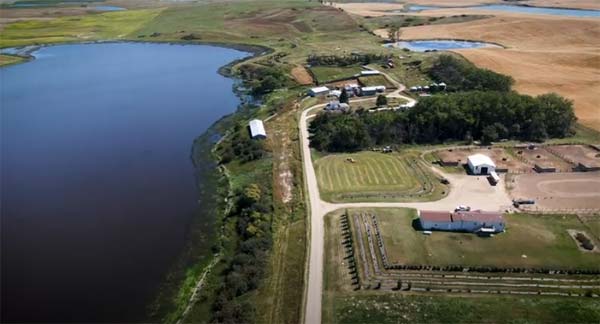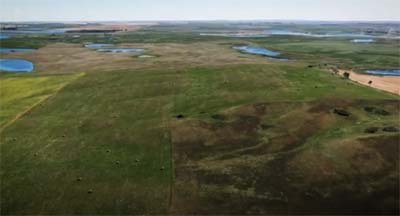As a result, his family’s beef cattle ranch operates in a constant state of adaption and innovation, thanks to his careful observation, openness to new perspectives, and ability to work with researchers and nature.
 After college, Kerry returned home to ranch with his parents Theo and Norma. In the four decades since, Kerry and his wife Brenda have become land management innovators. They’ve tested ways to enhance wildlife and pollinator habitat while improving the ranch’s bottom line. Utilizing cattle as a tool to improve the land for future generations is a practice they’ve come to know well.
After college, Kerry returned home to ranch with his parents Theo and Norma. In the four decades since, Kerry and his wife Brenda have become land management innovators. They’ve tested ways to enhance wildlife and pollinator habitat while improving the ranch’s bottom line. Utilizing cattle as a tool to improve the land for future generations is a practice they’ve come to know well.
The Dockters never lost sight of the fact that native grasslands are the backbone of their grazing operation. As a result, they developed rotational grazing systems to promote a diversity of native grasses. They’ve extended the grazing season while producing forage for the winter. Longer recovery periods between grazings allows the grass to stimulate root development while sequestering carbon.
When few ranchers in North Dakota were willing to try fire as a management tool, the Dockters used prescribed burns to enhance wildlife and pollinator habitat thanks to a strong working relationship with The Nature Conservancy.
The ranch sits in the heart of the Missouri Coteau (mixed-grass prairie) “Duck Factory” of Sheridan County. They’ve collaborated with the North Dakota State University and other researchers to demonstrate the compatibility of cattle grazing with waterfowl and grassland bird production. Haying now occurs after mid-July to allow grassland-nesting birds the time needed to hatch. Frequent dialogue with the U.S. Fish and Wildlife Service, and allowing hunters access to their land, further shows regulators and the public the compatibility of grass-based agriculture with vibrant wildlife populations.
 The Dockters have been able to increase the stocking rate of their pastures, while protecting their soil thanks to embracing a suite of conservation practices. On other parts of the ranch, innovative crop rotations, no-till practices and cover crops have improved soil health while eliminating erosion. Such efforts earned the family the Sheridan County Soil Conservation Achievement Award in 1994.
The Dockters have been able to increase the stocking rate of their pastures, while protecting their soil thanks to embracing a suite of conservation practices. On other parts of the ranch, innovative crop rotations, no-till practices and cover crops have improved soil health while eliminating erosion. Such efforts earned the family the Sheridan County Soil Conservation Achievement Award in 1994.
Much of the ranch’s native grassland and wetlands are permanently protected by conservation easements that ensure future access for grass-based agricultural uses.
Dockter Ranch changed its name to Dockter-Jensen Ranch when one of their three daughters, Kristi and her husband Kyle Jensen, moved back to help, learn and someday take over the ranch. The family’s concern for their land and community is genuine, as each have served on local school boards, township boards, fire departments and agricultural organizations.
 Sign In
Sign In
 Sign In
Sign In
